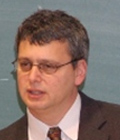Speakers and conference papers

Frank Upham teaches Property, Law and Development, and courses on comparative law and society with an emphasis on East Asia and the developing world. His scholarship focuses on Japan and China, and his book Law and Social Change in Postwar Japan received the Thomas J. Wilson Prize from Harvard University Press in 1987. Recent scholarship includes “Who Will Find the Defendant If He Stays with His Sheep? Justice in Rural China,” “From Demsetz to Deng: Speculations on the Implications of Chinese Growth for Law and Development Theory,” and “Resistible Force Meets Malleable Object: The Story of the ‘Introduction’ of Norms of Gender Equality into Japanese Employment Practice.” Upham has spent time at various institutions in Asia and works in Japanese and Chinese. Current research interests include the relationship between employment law and low birthrates in Japan, the role of the judiciary in economic transformation in 19th- and early-20th-century Japan, and the role of property rights in economic growth from the English Enclosure movement to contemporary China. Upham graduated from Princeton University in 1967 and Harvard Law School in 1974 and worked as a journalist in Asia and as an assistant attorney general in Massachusetts before entering academia. Prior to moving to NYU School of Law in 1994, he taught at Ohio State, Harvard, and Boston College law schools.
Presentation Title: The Paradoxical Role of Property Rights in Development
The presentation discusses the role of property rights in economic development. The presentation challenges the ubiquitous and rarely questioned assertion that legal property rights are necessary to economic growth and argue that this view of development is incomplete, misleading, and dangerous. It is incomplete because economic growth can and has occurred without property rights. It is misleading because it implies that property rights per se contribute to economic growth when in fact the role of property rights in growth is heavily contingent on the surrounding social context. It is dangerous because a failure to recognize the complexity of property rights will continue to mislead policy makers in their attempts to bring the world’s poorest people out of poverty. To illustrate the points, the presentation briefly mentions episodes of rapid economic growth in England, the US, contemporary China, and Japan.

Professor Lee is a scholar and lawyer in international economic law and law and development. He is Director of the Law and Development Institute and Visiting Professor of Law, Tulane University (2014- 2015). He has also taught and conducted academic research at leading universities throughout the United States, Europe, and Asia. He graduated in economics with academic distinction from the University of California at Berkeley and received law degrees from the University of Cambridge (B.A., M.A., Ph.D). Author of Reclaiming Development in the World Trading System (Cambridge University Press, 2006, reprint 2009), Safeguard Measures in World Trade: The Legal Analysis (Edward Elgar, 3rd ed. 2014), and Law and Development Perspective on International Trade Law (co-authored, Cambridge University Press, 2011), Professor Lee has published over sixty scholarly articles, book volumes, chapters and shorter notes with leading publishers in North America, Europe, and Asia, in the areas of international economic law, law and development, comparative law, and international commercial arbitration.
Presentation Title: Scholars out of Self-Estrangement after a Forty-Year Quest: Call for a New Analytical Model for Law and Development
For decades, scholars in law and development have studied interactions and dynamics among institutions, legal rules, and development. However, they have failed to develop a comprehensive analytical framework in law and development which assesses the impact of law, legal frameworks, and institutions (LFIs) on economic development in key areas. This is partly because much of the existing law and development studies have focused on the manner in which international aid organizations, such as the World Bank, have provided support in relation to law and development, the agendas that they have pursued, and the issues that it has created, but relatively less attention has been given to the needs of developing countries to develop appropriate legal rules and institutions with due consideration to the local conditions which may not make direct “transplants” workable. To address the need, two preliminary but important tasks must be performed: one is to identify the “key areas” subject to state regulation that are directly relevant to economic development, and the other is to develop proper methodology to assess the impact of LFIs on economic development. This article accounts the evolvement of law and development studies for the past four decades, examines the necessity and feasibility of developing the Analytical Law and Development Model, or “ADM”, and considers relevant issues about the methodology. This article serves as a foundational work for the ADM.

Diogo R. Coutinho is an Associate Professor at the University of Sao Paulo (USP), and a research fellow at the Brazilian Center of Analysis and Planning (CEBRAP). He holds a master from the London School of Economics and Political Science (2002) and a doctorate from the University of Sao Paulo Faculty of Law (2003). He was a visiting professor at the Center for Transnational Legal Studies – CTLS (London, 2009) and has written on law and development, administrative and economic law, and regulatory policies in Brazil. In 2013 he published the edited volume ‘Law and the New Developmental State: The Brazilian Experience in Latin American Context’ (Cambridge University Press)
Presentation Title: Law and Democratic Development: An Institutionalist Approach
The idea that “institutions matter” for development became a rhetoric mantra. Intricate questions persist, however: “how do they actually matter?” and “how can we shape and change institutions to make them more functional and democratic?”
In the early 20th Century scholars such as Thorstein Veblen and John Commons have challenged the neoclassical approach to economics. They embraced political economy premises and research questions (who wins? who loses? who decides?) and, also, departed from the viewpoint according to which we live in an institutionalized world in which human agency is affected by past the current institutional frameworks. While some “old” institutionalists have discussed the roles of the legal apparatus (legal norms, processes and institutions) in the institutional environment, their major concerns were not juridical. Something similar could be said about Polanyi’s famous “The Great Transformation”. In the 1990s Ha-Joon Chang and Peter Evans have revisited the “old” institutionalist tradition and, against the methodological individualism that characterized the New Institutional Economics (Coase, North, Williamson), have launched the “institutional political economy” (IPE) manifesto and research agenda. IPE has introduced more sophisticated legitimacy considerations to the development debate.
I argue that the IPE unveils a “hidden agenda” for the law and development (L&D) tradition. The main argument is that IPE can enrich L&D analysis and, at the same time, benefit from it in a win-win crossed-fertilization. I claim that L&D studies can be significantly enriched by the institutionalist agenda if legal scholars devote empirical and applied efforts to describe, analyze and and criticize key institutional arrangements – both technical (related to effectiveness) and political (related to legitimacy) – in actual development policies. Some goals of such an effort would be discussing functional/dysfunctional roles played by the law when it comes to public-public coordination and synergies, redistribution, experimentation and learning, participation, accountability, and transparency procedures.

Ding Chen is a lecturer at the School of Law, University of Newcastle (U.K.). Before moving into academic life, she practised criminal law as a public prosecutor in Guangdong Province, China. She completed her Ph.D at the University of Manchester. Her main research interests lie in interdisciplinary approach to company and commercial law. She currently involves in an ESRC-funded project on Law, Development and Finance in Rising Powers at the Centre for Business Research of the University of Cambridge.
Presentation Title: Law Reform, Institutional Quality and Stock Markets: Evidence from Interviews in China (paper by Ding Chen, Simon Deakin and Mathias Siems)
While Chinese business law has changed considerably in recent years, it is sometimes argued that, China still suffers from a lack of well-functioning institutions, in particular in terms of law enforcement. This paper analyses this contentious relationship between law reform, institutional quality and economic development. It is part of wider research project that addresses the four BRIC countries, adopting a method that combines quantitative and conceptual research at the macro-level with interviews with lawyers, policy makers and business persons at the micro-level. The research underlying the present paper is particularly based on interviews conducted in China in 2013 and 2014. Our preliminary findings confirm that most of the reforms had the aim to enhance the quality of China’s economic and legal institutions, sometimes disregarding established political views – as one respondent put it, today in China “Hayek is more important than Marx”. The interviews also suggest that in the economically most developed parts of China, in particular Guangdong Province, contract formality and reliance on legal enforcement is starting to displace inter-personal trust (guanxi) as the basis for commercial relations. This implies that China is heading towards a legally constituted form of market relations, at arms length from the state but also moving beyond guanxi, more quickly than many commentators have recognised. Overall it may be suggested that we observe something like a sequencing theory of institutional development. Both path dependencies and change are typical features of legal and economic development in China. Yet, those changes do not take place at the same time; rather, depending on the circumstances, one of them may evolve more quickly: this paper therefore suggests that understanding both spatial variation and temporal sequences is crucial for “law and development”, in particular but not only as it applies to the Chinese context.

Mathias Siems is Professor of Law at Durham University, England. He is a graduate of the Universities of Munich, Germany, and Edinburgh, Scotland, and has, amongst others, held visiting research positions at the European University Institute in Florence (as a Jean Monnet Fellow), Harvard Law School (as a Fulbright Scholar), and the Center for the Study of Law and Society at Berkeley. His main research interests lie in comparative and interdisciplinary approaches to private, company and commercial law. He currently also participates in an ESRC-funded project on Law, Development and Finance in Rising Powers at the Centre for Business Research of the University of Cambridge.
Presentation Title: Law Reform, Institutional Quality and Stock Markets: Evidence from Interviews in China (paper by Ding Chen, Simon Deakin and Mathias Siems)
While Chinese business law has changed considerably in recent years, it is sometimes argued that, China still suffers from a lack of well-functioning institutions, in particular in terms of law enforcement. This paper analyses this contentious relationship between law reform, institutional quality and economic development. It is part of wider research project that addresses the four BRIC countries, adopting a method that combines quantitative and conceptual research at the macro-level with interviews with lawyers, policy makers and business persons at the micro-level. The research underlying the present paper is particularly based on interviews conducted in China in 2013 and 2014. Our preliminary findings confirm that most of the reforms had the aim to enhance the quality of China’s economic and legal institutions, sometimes disregarding established political views – as one respondent put it, today in China “Hayek is more important than Marx”. The interviews also suggest that in the economically most developed parts of China, in particular Guangdong Province, contract formality and reliance on legal enforcement is starting to displace inter-personal trust (guanxi) as the basis for commercial relations. This implies that China is heading towards a legally constituted form of market relations, at arms length from the state but also moving beyond guanxi, more quickly than many commentators have recognised. Overall it may be suggested that we observe something like a sequencing theory of institutional development. Both path dependencies and change are typical features of legal and economic development in China. Yet, those changes do not take place at the same time; rather, depending on the circumstances, one of them may evolve more quickly: this paper therefore suggests that understanding both spatial variation and temporal sequences is crucial for “law and development”, in particular but not only as it applies to the Chinese context.

David Hiez is Law Professor at the University of Luxembourg since 2006 and has been head of the Law Department since 2012. He was a lecturer at the University of Lille (France).
His research areas initially were civil law and legal theory, mainly property and contract law. He also developed his interest in European private law and was subsequently dedicated to the legal aspects of social economy (cooperative law, association law — Coopératives Création Organisation Fonctionnement, Delmas, 2013). For the past few years, he has been interested in African law, first in African cooperative law, and then focused on the notion of law in Africa and its relationships with other normativities. He is involved in various research groups and editorial boards, published and edited many papers and books, and organized conferences on these topics.
Presentation Title: Towards the Elaboration of a More Pluralistic Legal Landscape for Developing Countries in West Africa: Which Role for Law and Development? (paper by David Hiez and Séverine Menétrey)
French legal literature illustrates gaps in the Law and Development approaches. Studies in business law in West Africa, especially studies on so-called “droit OHADA” (for “Organization for the Harmonization of Business Law in Africa”), are numerous and homogenous. All written in French, they adopt a strongly dogmatic and positivist approach. Law and Development studies in this field are rare, if not inexistent. Because OHADA is a perfect product of the second Law and Development movement, it is a good object of research to question the premises of law and development, starting by the implicit conception of the words “law” and “development”.

Severine Menétrey is an Associate Professor of Judicial Law at the University of Luxembourg. Previously, she taught at the Faculty of Law of Nice University. She was also a lecturer in Université Panthéon-Assas Paris II and Université Laval (Quebec).
Her primary teaching and research interests are civil procedure, international dispute resolution and arbitration. She is the author of two books in civil procedure and numerous articles on judicial law. For several years, she is a member of the “Intstitut euro-africain de droit économique” (http://www.ineadec.org). And a part of her research is dedicated to the Organization for the Harmonization in Africa of Business Law, referred to as “OHADA” (from the French: “Organisation pour l’Harmonisation en Afrique du Droit des Affaires”). She is the co-editor of a book Questions de droit économique: les défis des États africains.
She holds a Doctorate in Law from Paris II Panthéon-Assas University and Laval University (LL.D).
Presentation Title: Towards the Elaboration of a More Pluralistic Legal Landscape for Developing Countries in West Africa: Which Role for Law and Development? (paper by David Hiez and Séverine Menétrey)
French legal literature illustrates gaps in the Law and Development approaches. Studies in business law in West Africa, especially studies on so-called “droit OHADA” (for “Organization for the Harmonization of Business Law in Africa”), are numerous and homogenous. All written in French, they adopt a strongly dogmatic and positivist approach. Law and Development studies in this field are rare, if not inexistent. Because OHADA is a perfect product of the second Law and Development movement, it is a good object of research to question the premises of law and development, starting by the implicit conception of the words “law” and “development”.

Currently in her first year of the PhD program at Osgoode Hall Law School in Toronto, Canada, Sara previously earned in Master of Laws from the University of Toronto. Her LLM thesis, “Assessing the Petroleum Fiscal Regimes of Nigeria, Ghana, and Cameroon”, evaluated the current tax systems governing oil extraction in these countries. As the focus of her PhD, Sara is researching the governance of natural resource extraction in resource-rich African states. Sara also holds a Bachelor of Arts in Political Science and Middle Eastern and African Studies from the University of Alberta, a Juris Doctor from the University of Ottawa and an MA in International Affairs (with a concentration in Development Studies) from the Norman Paterson School of International Affairs at Carleton University.
Presentation: Conceptualizing the Developmental State in Resource-Rich Sub-Saharan Africa
The success or failure of resource-rich African economies can depend on the role the state plays in empowering the private sector and transforming national economies. Law and development scholars describe this as the “developmental state.” At its core, the developmental state envisions a greater role for the state in the promotion of a nation’s economic growth. When considering successful examples of the developmental state, most eyes turn to the countries of East Asia. To broaden the application of the concept to resource-rich Sub-Saharan Africa, one can look no further than Botswana. Since gaining independence in 1966, Botswana’s involvement in its diamond sector ranged from encouraging exploration by foreign mining companies through collaborative mechanisms such as joint ventures, to constructing a technology park to support the industry today. This paper argues that since independence, Botswana’s developmental state has graduated from legislating investment promotion to expending government revenues to build investment-promoting infrastructure. Relying on the success stories of Botswana and East Asia, this paper conceptualizes a graduated developmental state model for resourcerich Sub-Saharan African states.

William Hubbard is an Assistant Professor of Law at the University of Chicago Law School, where he teaches courses in Civil Procedure and Law & Economics. His research focuses on the economic analysis of law and legal institutions, with an emphasis on how the design of courts and legal procedures affects behavior. He received his JD and his PhD (Economics) from the University of Chicago. Before joining the Law School, he clerked for the Hon. Patrick E. Higginbotham of the U.S. Court of Appeals for the Fifth Circuit and practiced law as a litigation associate at Mayer Brown LLP in Chicago, where he specialized in commercial litigation, electronic discovery, and appellate practice. Currently, he serves as an editor of the Journal of Legal Studies. Recent research has examined diverse topics, from the worldwide boom in higher education for women to the effect of new procedural rules on litigation trends in the United States. Current research includes game-theory approaches to litigation and international conflict and empirical studies of the United States and Indian Supreme Courts.
Presentation Title: Reflections on the New Analytical Model
This presentation will offer reflections on Prof. Lee’s paper from the perspective of a law-andeconomics scholar who is a neophyte in the field of law and development. One aspect of the “estrangement” that Prof. Lee references is the relative lack of attention to economic development within the law and economics tradition. This raises questions: How can new analytical frameworks in law and development generate novel questions and otherwise inform economic analysis of law? Conversely, how can new approaches in law and economics enrich future work on law and development?

Colin Crawford has expertise in international development and law and has lectured and written worldwide on environment and urban issues and related topics. His teaching and research focus on environmental and land-use issues, particularly comparative and cross-cultural environmental justice concerns, with an emphasis on Latin America and the Caribbean.
Crawford joined the Tulane faculty and the Payson Center for International Development in 2010. He previously taught at Georgia State University College of Law, where he founded and co-directed the Center for the Comparative Study of Metropolitan Growth and created and directed an inter-disciplinary summer program in Rio de Janeiro. He also founded Study Space, a project that annually brings together academics and graduate students for an intensive study of a global mega-city.
Presentation Title: Reflections on the New Analytical Model
The law and development field continues to develop apace, as this conference and the professional activities of its participants attest. That being said, a quick review of both scholarly writing in the law and development field and also of the curricula offered by emerging centers of law and development studies indicate that the focus of such work tends to be on law and economic development. This is somewhat surprising: most non-law, university-based development studies centers not only feature economic development as a subject of study but also work to offer well-rounded curricula that focus on questions of sustainability, and on, for example, political and social development. Similarly, development studies as a field is today much deeper and richer than the one-dimensional study of economic development at its founding.
This paper will first provide an overview of most existing law and development study. Second, it will compare law and development writing in general to the larger concerns of development studies. Third and finally, it will indicate how law and development curricula might be broadened and deepened by borrowing from development studies writing and curricula generally to offer law and development students and practitioners a better-integrated, more comprehensive approach to law and development study.

Ada Ordor is an Associate Professor at the Centre for Comparative Law in Africa, Faculty of Law, University of Cape Town (UCT). Having worked in various sectors since 1990, including legal practice, civil society advocacy and academia, she explores issues of law and development from various perspectives. She held research positions at the African Gender Institute, UCT in 2000 as a visiting associate and at the Johns Hopkins University Institute for Policy Studies, Center for Civil Society Studies, Baltimore in 2003 as a senior international philanthropy fellow. She is also an international fellowship alumna of the American Association of University Women. Her recent work include three 2014 publications: ‘The Nonprofit Sector in the Context of Law in Development in Africa’ Journal of African Law vol. 58 issue 1, 2014; ‘Exploring Civil Society Partnerships in Enforcing Decent Work in South Africa’ Chapter 9 of Deirdre McCann et al (eds) Creative Labour Regulation: Indeterminacy and Protection in an Uncertain World (2014 Palgrave Macmillan/ILO) and ‘Associational Life and Women’s Constitutional Rights in Africa’ Chapter 8 of Stefanie Rohrs and Dee Smythe et al (eds) In Search of Equality: Women, Law and Society in Africa (2014, UCT Press).
Presentation Title: Tracking the Law and Development Continuum through Multiple Development Pathways
Ideas expressed as law and development theories have sought to connect law and development by creating a framework within which the role of law in development may be better understood and perhaps even packaged as a ‘kit’ to be recommended to governments as a way of advancing development. A measure of consensus is often required for an idea to have legitimacy. Thus over the years, thoughts on law and development have crystallised around various concepts such as economic growth, the rule of law, the empowerment of the poor and the growth of institutions, among others. What seems obvious from these theories and debates is that while there may be a measure of consensus around particular theses or positions, unanimity among all thinkers, scholars and actors is not likely to follow, nor is it necessarily desirable. This paper draws out threads of thought that present these positions as various facets of the development dynamic or else, various points on the multi-dimensional development continuum. Flowing from this is the thought that perhaps what should be sought is a framework or frameworks for law and development constituted of elements that are at the minimum, flexible, elastic, adjustable and realistic enough to cater to what people and governments in a particular precinct and at a particular time require of it.

Joel H. Samuels is a Professor at the University of South Carolina School of Law and Director of the Rule of Law Collaborative. Professor Samuels’ scholarship explores the challenges and opportunities presented by changing notions of sovereignty, and his written work addresses international boundary disputes, maritime piracy and cross-border litigation. During his time in private law practice at Covington & Burling, Professor Samuels was involved in the ad hoc arbitration of the Eritrea-Ethiopia boundary dispute and led the team that drafted a new Civil Service Code for Eritrea. Professor Samuels has also worked at the World Bank in both Washington (in the Office of the Vice President for Africa) and in Zimbabwe (at the African Capacity Building Foundation) focusing on capacity building in economic policy analysis and development management. During that time, he was a member of the World Bank team that drafted the Initiative for Capacity Building in Africa, a cornerstone document in the World Bank’s initial efforts in that arena. Before joining the World Bank, Professor Samuels worked extensively in Russia in the early 1990s on efforts to combat organized crime, and he was an observer of the Russian Constitutional Assembly in 1993. In addition, he has been a contributor to several Russian newspapers and magazines and a variety of African publications.
Presentation Title: An Interdisciplinary Approach to Rule of Law Studies as a Model for Law & Development Studies (paper by Joel Samuels and Aparna Polavarapu)
Rule of law studies as a field has gained real traction in recent years, but its contours can be confusing and undefined. This co-authored paper by two legal scholars actively engaged in rule of law studies aims to lay out one interdisciplinary approach to rule of law that may, in turn, inform efforts to develop a new analytical framework for law and development studies.
Academic programs as well as government-based development and assistance programs – like many early rule of law efforts – have focused on the role of the state and of the law in fostering growth. The emphasis on law as a tool of the state to be wielded to encourage development can be problematic because of its heavy reliance on both the state and the law to achieve systemic change. Ironically perhaps, we believe that rule of law studies – which often focus on the same factors – can allow for a broader approach to law and development studies.
As conceived by the authors of this paper, an interdisciplinary rule of law approach can provide a localized, culturally and geographically sensitive – and yet holistic – framework to promote the overall development of a nation and its people. Rule of law theory not only acknowledges and embraces the value of actors outside of the state, it also promotes a necessary intersection between and among those actors. A robust rule of law definition will emphasize legal concepts (e.g., the functioning of laws, the accountability of government, the protection of rights, a fair and independent judiciary), while also reflecting the need to reach across boundaries to create an interdisciplinary model.

Professor Polavarapu teaches in the areas of Rule of Law, Transnational Law, Human Rights Law, and Comparative Law. Her research focuses on rule of law and human rights, with particular emphasis on access to justice, land rights and customary/statutory law interaction. She has worked in Uganda, Kenya, Rwanda, and Tanzania, and has substantial experience throughout Africa. Prior to coming to South Carolina, she was a teaching fellow with Georgetown’s International Women’s Human Rights Clinic. Prior to that, she practiced law at Edwards Angell Palmer & Dodge LLP in Boston. Professor Polavarapu received her JD and LLM from Georgetown University Law Center, her undergraduate degree from the Massachusetts Institute of Technology, and a Masters degree in international affairs from The Fletcher School of Law and Diplomacy.
Presentation Title: An Interdisciplinary Approach to Rule of Law Studies as a Model for Law & Development Studies (paper by Joel Samuels and Aparna Polavarapu)
Rule of law studies as a field has gained real traction in recent years, but its contours can be confusing and undefined. This co-authored paper by two legal scholars actively engaged in rule of law studies aims to lay out one interdisciplinary approach to rule of law that may, in turn, inform efforts to develop a new analytical framework for law and development studies.
Academic programs as well as government-based development and assistance programs – like many early rule of law efforts – have focused on the role of the state and of the law in fostering growth. The emphasis on law as a tool of the state to be wielded to encourage development can be problematic because of its heavy reliance on both the state and the law to achieve systemic change. Ironically perhaps, we believe that rule of law studies – which often focus on the same factors – can allow for a broader approach to law and development studies.
As conceived by the authors of this paper, an interdisciplinary rule of law approach can provide a localized, culturally and geographically sensitive – and yet holistic – framework to promote the overall development of a nation and its people. Rule of law theory not only acknowledges and embraces the value of actors outside of the state, it also promotes a necessary intersection between and among those actors. A robust rule of law definition will emphasize legal concepts (e.g., the functioning of laws, the accountability of government, the protection of rights, a fair and independent judiciary), while also reflecting the need to reach across boundaries to create an interdisciplinary model.

Stéphanie de Moerloose is a Professor of International Development Cooperation at University Austral, Argentina, since 2009. After having worked in Brussels as a legal officer at the EEA Grants, principally in social development projects in Eastern Europe, she is since 2009 a legal consultant of international financial institutions and NGOs on environmental and social standards and investment conflicts resolutions; recently, she has worked in agribusiness, water rights and infrastructure projects in Latin America and Africa. She conducts research into the legal aspects of international financial institutions’ development cooperation. She is admitted to the New York Bar and holds a LL.M. from New York University and a Master Degree from the Faculty of Law of the University of Geneva, Switzerland; she is a Doctoral Candidate of University Austral and University of Geneva.
Presentation Title: The Example of the World Bank’s Sustainable Development Approach and the Need for a Unified Field of Law and Development Studies in Argentina.
The legal approach to economic development is well alive and there is a crucial need for systematic investigations in the field. This paper argues that the adoption of the principle of sustainable development by the World Bank is an example of the persistence of the law and development approach. Indeed, the World Bank’s interpretation of the principle translates into its projects; through loan conditionality, it applies to Recipients and therefore regulates behaviours at the country level. This potentially results in the “legal transplantation” of a “cross-culturally valid” principle. The paper will present a case study of the sustainable development principle’s application by the World Bank in Argentina: the “Riachuelo-Mataza Basin Sustainable Development Program”. Based on the difficulties of implementation of the program and on academic experience in Argentine Universities, the paper attempts to show that, to bridge the gaps described by Trubek and Galanter, there is a need for Argentine scholars to specialize in law and development as a unified field, in order to fine tune the development approach of international development actors to national realities and thus create a real impact.

Maya Berinzon is Research Faculty at Virginia Tech’s Institute for Policy and Governance. Her work focuses on questions of legal reform and governance in sub-Saharan Africa. This has included fieldwork in Kenya on the codes of conduct regulating the cut-flower industry and work in South Africa at the International Development Research Centre on the particular challenges of implementing international financial institution regulations in Africa. She has done work for the American Bar Association on the suppression of human rights through anti-terrorism legislation in francophone Africa and for the International Centre for Not-for-Profit Law to help the Rwandan government establish a civil service code of conduct. Her most recent research has focused on how laws are transplanted into Africa, along with the validity and endurance of such transplants. She has a forthcoming paper on the transplantation of a UN Model Law on HIV disclosure into African countries and the concerns around encouraging homogenous implementations of laws. She holds a Masters of Law in public and international law from the Université Paris X – Nanterre, a J.D. from the Washington College of Law and a B.A. in International Development from the University of Ottawa.
Presentation Title: Reaching for the Bar: How Bar Association and Societies in sub-Saharan Africa contribute to International Development
Dictators ruled many African states in the 1970s and 1980s. During that period, organized public groups, such as trade unions, that were not under government control were typically either crushed or incorporated into the government structure. Bar associations were often uniquely successful at resisting these regimes. This strength appears even more peculiar when one considers that during this time period the executive often disregarded or was simply unable to enforce existing laws. Nonetheless, lawyers through bar associations were able to maintain a measure of autonomy from the government and were an important mobilizing force at democratization in many African countries. Using a capabilities lens to examine the impact that bar associations have had on international development, this paper analyzes what characteristics contributed to the role that lawyers and bar associations played at democratization, what factors led to autonomous bar organizations, and what lessons this may hold for the role of law and the role of foreign organizations in international development.

Over the course of his extensive career, Dr. Bertrand served as Vice President for University Planning, Research & Innovation, Tulane University, and Co-Directed and founded three Academic Public Health Institutions: the Department of International Health and Development at Tulane University, Center for International Health and Development at Tulane University, and the Zaire School of Public Health at the University of Kinshasa. A leading expert in International Development, he designs, manages, and leads multimillion dollar UN, WHO, and CDC development programs throughout Africa, South America, and Southeast Asia. As Wisner Professor of Public Health, Dr. William E. Bertrand provides instruction in Information and Communication Technology and Applied Research in Development. Dr. Bertrand is an active international health and development practitioner serving communities around the world as consultant, capacity development, and program design, monitoring and evaluation.
Presentation Title: Trade, Development, and Child Labor
International trade has been used as a vehicle for economic development in many developing countries. In the process, child labor has been extensively used to produce export products at low costs, and this has led to significant human rights problems. The presentation addresses the use of child labor in the context of international trade and suggests possible solutions, such as trade sanctions against exports produced by child labor.

Adam Feibelman’s teaching and research focus on bankruptcy law, regulation of financial institutions, legal issues related to sovereign debt and international monetary law. His current work explores the IMF’s role in international financial regulation. His recent scholarship includes The IMF and Regulation of Cross-Border Capital Flows, Chicago Journal of International Law, Europe and the Future of International Monetary Law (Transnational Law & Contemporary Problems), Involuntary Bankruptcy for States (Duke Journal of Constitutional Law & Public Policy) and American States and Sovereign Debt Restructuring (in Skeel & Conti-Brown, eds., When States Go Broke). He joined the Tulane faculty in 2009. Prior to that, he was a faculty member at the University of North Carolina School of Law and University of Cincinnati School of Law and taught as a Bigelow Fellow at the University of Chicago. He clerked for Judge Gilbert S. Merritt of the U.S. Court of Appeals for the Sixth Circuit.
Presentation Title: Law, Development, and Global Stability
The practice of law and development and the literature on the topic have both tended to focus on domestic benefits, needs, and constraints. Concerns about legal development tend to map onto the jurisdictions in which legal systems operate. With the exception of debates about the appeal of uniformity across jurisdictions, it has been relatively rare for law and development scholars and practitioners to weigh external or international factors heavily in the policy or critical calculus. After the recent global economic and financial crisis, however, concerns about external and global stability are much more salient. Not surprisingly, domestic policymakers and potential reformers are increasingly expected to include external and systemic effects in their development policies. The role of consumer insolvency law in development policy provides a good example of this shift. Before the crisis, many jurisdictions were encouraged from within and abroad to consider expanding the scope of consumer debt relief. Before the crisis, the primary factors affecting this assessment were domestic and internal, including especially aspects of the domestic financial sector and sociological orientation toward debt forgiveness. After the crisis, domestic policymakers have been encouraged to accelerate development of consumer insolvency law both to reduce domestic vulnerability to external shocks and to reduce the likelihood that household over-indebtedness will contribute to systemic instability.

Ada Bogliolo Piancastelli de Siqueira currently pursues her SJD at Georgetown as a Brazilian National Research Council (CNPq) researcher and is an Honorary Fellow at the Institute of International Economic Law. Her current dissertation re-discusses the working logic of the World Trade Organization in the context of alternative development strategies and social understandings of the trading system. Before coming to Georgetown Law, Ada was a Santander Scholar at the Wolfson College, University of Cambridge. She completed a Masters of Philosophy (MPhil) in International Studies and Politics researching the relationship between law and politics at the World Trade Organization. Previously, Ada acquired a Masters in Law (LLM) in International Public Law at the London School of Economics and Political Sciences in 2011. She holds a Law degree from the Federal University of Santa Catarina, Brazil.
Presentation Title: The Policy Space of Development Strategies: An Analysis of Industrial Policy and Regulatory Coherence between Brazil and the U.S.
Trade is considered one of the most important stimuli for economic growth, and governments often make deliberate efforts to coordinate economic activities and create incentives in their domestic markets in order to take advantage of trade-related development strategies. The delicate balance between regulatory policy autonomy and protectionism lies at the very center of the international trading system. At the World Trade Organization (WTO), Member States are constantly stepping over, shifting and rewriting the unclear line that divides permitted industrial and development policies from protectionist ones. By analyzing the interaction between different developmental strategies and the WTO’s legal regime, this paper provides an opportunity to test assumptions about traditional models of economic governance. It questions the clear-cut narrative separating liberal economic policies and developmental policies at the national level, and traces the repercussions of this narrative to the transnational legal level. In order to do so, we compare policies for the auto industry adopted by Brazil and the United States in the aftermath of the 2007-08 financial crisis in order to analyze the relationship between these different regulatory frameworks, their economic rationale and the room for policy space they are granted under the international economic order. We trace parallels between these countries’ policies with regards to the role of the government in steering the industrial base towards environmental goals, innovation and strengthening of the value chain. We argue that there is little difference in their (economic) policy rationale. Instead, we submit that the differentiated perceptions of these policies in the international scenario results from perceptions of their regulatory models. We take this argument further to assert that the WTO acts in a manner of harmonizing these divergent regulatory frameworks by selecting permissible policies that recursively feed into another member’s future regulatory strategies.

Julia Cadaval Martins is an SJD candidate at Georgetown Law. Her research is situated in the intersection of law, institutions, and development, focusing on cooperation, institutional design, federalism, and water law and governance. Before coming to Georgetown, she was a Visiting Researcher at Harvard Law School and a Research Assistant at the Harvard Environmental Law and Policy Program. Julia earned her LL.M. degree at Harvard Law School, where she was also a Summer Academic Fellow. Previously, she had completed a master’s degree at the Pontifical Catholic University of Rio de Janeiro, and a Bachelor of Laws degree at the Rio de Janeiro State University. In Brazil, Julia worked as a consultant on a social and economic development project in the North of Brazil. She was also a researcher in a project funded by the Brazilian government that assessed the problems in the relationship between regulatory agencies and the judiciary.
Presentation Title: The Policy Space of Development Strategies: An Analysis of Industrial Policy and Regulatory Coherence between Brazil and the U.S.
Trade is considered one of the most important stimuli for economic growth, and governments often make deliberate efforts to coordinate economic activities and create incentives in their domestic markets in order to take advantage of trade-related development strategies. The delicate balance between regulatory policy autonomy and protectionism lies at the very center of the international trading system. At the World Trade Organization (WTO), Member States are constantly stepping over, shifting and rewriting the unclear line that divides permitted industrial and development policies from protectionist ones. By analyzing the interaction between different developmental strategies and the WTO’s legal regime, this paper provides an opportunity to test assumptions about traditional models of economic governance. It questions the clear-cut narrative separating liberal economic policies and developmental policies at the national level, and traces the repercussions of this narrative to the transnational legal level. In order to do so, we compare policies for the auto industry adopted by Brazil and the United States in the aftermath of the 2007-08 financial crisis in order to analyze the relationship between these different regulatory frameworks, their economic rationale and the room for policy space they are granted under the international economic order. We trace parallels between these countries’ policies with regards to the role of the government in steering the industrial base towards environmental goals, innovation and strengthening of the value chain. We argue that there is little difference in their (economic) policy rationale. Instead, we submit that the differentiated perceptions of these policies in the international scenario results from perceptions of their regulatory models. We take this argument further to assert that the WTO acts in a manner of harmonizing these divergent regulatory frameworks by selecting permissible policies that recursively feed into another member’s future regulatory strategies.

Christopher D. Boom is a Ph.D. candidate in Philosophy at Tulane University and a current graduate fellow at Tulane’s Center for Ethics and Public Affairs. He previously received a J.D. and an LL.M. in Transnational Law from Temple University and holds a B.A. in Philosophy from Loyola University New Orleans. Chris’s philosophical research focuses on topics in jurisprudence, political philosophy, and ethics, and his doctrinal interests include constitutional law, international and comparative law, and immigration law. His dissertation explores the relationship between the rule of law and human rights, and its significance for our understanding of the larger relationship between law and morality. Before coming to Tulane, Chris practiced immigration law with Klasko, Rulon, Stock & Seltzer, LLP, in Philadelphia. of Pretoria.
Presentation title: The Importance of the Thin Conception of the Rule of Law for International Development: A Decision-Theoretic Account.
In recent years, the field of law and development has increasingly focused on the role of the rule of law in, among other things, economic growth, legal compliance, and respect for human dignity. Yet our understanding of the rule of law’s significance in these areas is complicated by the fact that the very concept of the rule of law is deeply contested. On the one hand, some rule of law theorists and advocates endorse a ‘thin’ conception of the rule of law on which the rule of law imposes merely formal constraints on state action: in particular, requiring only that a state treat those within its jurisdiction in accord with general laws that are publicized, relatively stable, and the like. By contrast, others endorse a ‘thick’ conception on which the rule of law imposes additional, substantive constraints: in particular, requiring further that a state establish and enforce at least a minimal level of legal protection for human rights (including, on some accounts, protection for rights to private property and the freedom of contract). Understandably, the thick conception of the rule of law has tended to receive more attention from law and development scholars and practitioners. For one, the significance of the thick conception for development is relatively straightforward. Even more importantly, because state adherence to the thin conception does not only fail to necessarily result in growth, compliance, and respect for dignity, but can actually frustrate their achievement, promoting such adherence is clearly not itself a full-fledged development goal. As a result, although scholars and practitioners recognize the relevance of the thin conception for development due to its role in securing expectations, we currently lack a rigorous, unified account of how that role contributes to development across these various domains. This paper aims to help fill this gap in the literature through a decision-theoretic analysis of the effects of adherence to the thin conception on rational behavior. It concludes by proposing some new avenues for research into these and related roles for the thin conception in international development.

Dr Chilenye Nwapi is a Banting Postdoctoral Fellow at the Canadian Institute of Resources Law, University of Calgary, Canada. He is also a Senior Fellow at the Institute for Oil, Gas, Energy, Environment and Sustainability, Afe Babalola University, Nigeria. Dr Nwapi holds a PhD from the University of British Columbia, an LLM from the University of Calgary, and an LLB from Imo State University, Nigeria. In addition to the Banting Postdoctoral Fellowship, he also received the SSHRC Postdoctoral Fellowship and until then was an Eyes High Postdoctoral Fellow at the University of Calgary. Recently, he was 1 of 10 emerging African scholars selected to participate at the 7th SouthSouth Tricontinental Institute held in Thailand in November 2014. He has taught Environmental Impact Assessment Law at the Faculty of Law, University of Calgary.
Presentation Title: Defining the “Local” in Local Content Requirements in the Oil and Gas and Mining Sectors for Sustainable National and Subnational Economic Development in Developing Countries
Determined to maximize the gains of foreign direct investment (FDI), many developing countries are designing protectionist mechanisms, typically in the form of local content requirements (LCRs), to ensure that FDI engenders real economic development in their countries. Typically, LCRs aim to promote increased local participation in FDI by directing the utilization of indigenous companies in the procurement of goods and services, employment of locals and the use of local raw materials by foreign investors. While LCRs are proliferating, particularly in the oil and gas sector, there is little critical analysis of the meaning of “local” in LCRs. A review of LCRs of many jurisdictions shows that not much thought has been given to the term “local”. This paper will examine the many definitions of local content in selected jurisdictions to show how the “local” is excluded from most LCRs. The paper will argue that if policymakers do not pay close attention to how “local” is defined, the benefits of LCRs may be captured by “outsiders”, thereby producing the dreaded phenomenon of “economic capture”. If policymakers do not anticipate how LCRs may trigger or intensify resource conflicts, LCRs may end up on the bleeding edge rather than the cutting edge. Given that revenues from extractive resources are managed by national governments in most jurisdictions, LCRs can provide a mechanism to meet the demands of subnational stakeholders, such as local governments and communities, which will in turn enable companies to obtain the social license to operate. This will not happen unless LCRs give proper recognition to the indigenes of the localities where the extractive activities take place. Community frustration resulting from seeing lucrative jobs given to “outsiders” can stir up conflicts. LCRs can serve as a mechanism for reducing conflict over control of natural resources, ensuring simultaneously that the subnational constituent where the resource extraction takes place does not depend for its development solely on the revenue from the resources that flows back to it from the national government.
 Dr. Hye Seong Mun
Dr. Hye Seong Mun Professor Colin Picker
Professor Colin Picker Dr. Tomer Broude
Dr. Tomer Broude Professor Wang Jiangyu
Professor Wang Jiangyu Professor Won-Mog Choi
Professor Won-Mog Choi Dr. Andrew D Mitchell
Dr. Andrew D Mitchell Dr. Salim Farrar
Dr. Salim Farrar Professor Junji Nakagawa
Professor Junji Nakagawa Professor Maureen Irish
Professor Maureen Irish Professor David Gantz
Professor David Gantz Professor Moshe Hirsch
Professor Moshe Hirsch
 Professor Yong-Shik Lee
Professor Yong-Shik Lee